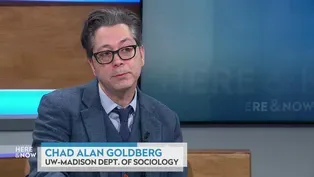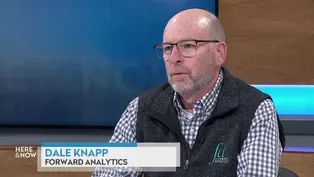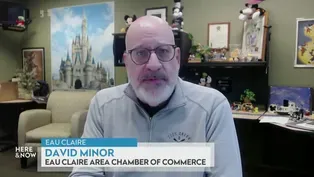Here and Now
Bobby Peterson on Removing Medical Debt From Credit Reports
Clip: Season 2300 Episode 2326 | 5m 27sVideo has Closed Captions
Bobby Peterson on the scale of medical bills and a rule to block debt on credit reports.
ABC for Health Executive Director Bobby Peterson discusses the scale of medical bills in Wisconsin and a rule by the outgoing Biden administration to block such debt from appearing on credit reports.
Problems with Closed Captions? Closed Captioning Feedback
Problems with Closed Captions? Closed Captioning Feedback
Here and Now is a local public television program presented by PBS Wisconsin
Here and Now
Bobby Peterson on Removing Medical Debt From Credit Reports
Clip: Season 2300 Episode 2326 | 5m 27sVideo has Closed Captions
ABC for Health Executive Director Bobby Peterson discusses the scale of medical bills in Wisconsin and a rule by the outgoing Biden administration to block such debt from appearing on credit reports.
Problems with Closed Captions? Closed Captioning Feedback
How to Watch Here and Now
Here and Now is available to stream on pbs.org and the free PBS App, available on iPhone, Apple TV, Android TV, Android smartphones, Amazon Fire TV, Amazon Fire Tablet, Roku, Samsung Smart TV, and Vizio.
Providing Support for PBS.org
Learn Moreabout PBS online sponsorshipvery much.
>> Thank you to letters keep coming to you from the hospital about the balance you owe.
>> Well, this week, the Biden administration announced unpaid medical bills will no longer appear on credit reports removing $49 billion in such debt from the credit reports of 15 million Americans.
And nearly 400,000 people in Wisconsin.
Medical debt lowers credit ratings, preventing people from getting loans, renting apartments, even getting a job here with his reaction, attorney Bobby Peterson from ABC for health, a nonprofit public interest law firm in Madison, and Bobby, thanks for being her.
>> Thanks for inviting me.
Appreciate it.
>> So when you heard about this, what was your reaction?
>> I thought it was great.
I think, you know, getting medical debt off of people's credit report is a real positive move in the right direction.
You know, a lot of times people don't choose to get ill or sickness or working with a family member that has big bills because of illness or sickness.
And to have that compromise your credit report.
I think, is just in the wrong direction.
It's not a good indicator of credit worthiness.
Oftentimes.
So removing it, I think is definitely a move in the right direction.
>> You call the current system an electronic debtor's prison.
How so?
>> Well, if you think about it, you know, in the old days they would you didn't pay your bills.
They locked you up and threw you in prison until you paid your bills.
Today it's a situation where you have electronic handcuffs on and electronic debtor's prison.
It's your credit score.
If your credit score doesn't meet the certain metrics that people want, you can't get a car apartment.
You can't get a job sometimes.
And so it really is an electronic debtor's prison that traps people sometimes in poverty, by eliminating medical debt from this equation, I think it can lift a lot more people out of this.
Electronic debtor's prison.
And give them an opportunity to move forward to get credit.
Apartment jobs, things like that.
I mean, the estimates are that people's by removing medical debt from their credit scores, could raise their credit score by up to 20 points.
>> So what incentive, though, remains for getting people to pay their medical bills?
>> Well, I mean, I think that, you know.
Part of the issue with medical bills is that we have such a confusing, complicated system that trying to understand it and figure it out at the front end is extraordinarily difficult for most.
Consumers, particularly if you're sick, if you're helping a family member trying to work through that, it's impossible.
What a lot of people don't understand is that those decision makers are saying no to coverage.
That usually results in bills that aren't paid.
And so when those bills don't get paid, it's a cost for all of us.
We've talked before about, you know, the hospital association does an annual uncompensated care report in Wisconsin that uncompensated care report was about $1.4 billion in 2023.
That's money that just isn't getting paid.
We also know that that medical billing and medical debt, sometimes there's so many mistakes made in the process that people are billed inappropriately.
So again, it's not a good measure sometimes of someone's credit worthiness because errors mistakes our solution to this is to really work at the front end of the process, try and help people avoid that medical debt before it becomes a bill.
Streamline the system and simplify the system a little bit more in your experience with clients, how does the debt mostly accrue and mostly for whom?
For a lot of people that have ongoing chronic medical conditions, people that have children with special health care needs, adults with disabilities because they are high users of the system, they end up getting in those more encounters result in more bills and medical debt.
And, you know, it's not just hospital debt.
It's prescription drug debt.
It's going to physicians.
It's going to physician groups, dental bills, all of that accumulates.
And it just becomes a lot for people to try and deal with and try and work through.
>> So this is a Biden rule.
How likely might it be that it's overturned by the incoming administration?
I'd say there's a good chance that it might get overturned.
that's going on right now is filed a day after the rule was published, and the rule doesn't take effect until 60 days after publication.
So the rule was published on Monday, 60 days later.
The rule will take effec.
A lawsuit was filed in Texas.
So we've seen this before.
So a little bit of venue shopping there to find a judge that might be likely to overturn it.
We don't know that that's going to happen, but we suspect that was part of the strategy.
We also know that the congressional Review Act gives Congress an opportunity to review these administrative rules within 60 days to be able to overturn them.
It has to be approved by the House.
The Senate, and signed by the president.
There's very narrow margins.
So, you know, medical debt is one of those issues that does have some bipartisan appeal.
So maybe it'll make it through.
But I'm not I'm not super optimistic about that.
>> All right.
Well Bobby Peterson, thanks very much.
Chad Alan Goldberg on Populist Politics and Jan. 6's Legacy
Video has Closed Captions
Chad Alan Goldberg on researching the rise of populism and the impacts of Jan. 6. (17m)
Dale Knapp on a Projected Population Decline for Wisconsin
Video has Closed Captions
Dale Knapp on factors contributing to a projected population decline in Wisconsin by 2050. (5m 43s)
David Minor on the Chippewa Valley's Health Care Needs, Gaps
David Minor discusses efforts to expand hospital and clinic facilities after closures. (6m 51s)
Here & Now opening for January 10, 2025
Video has Closed Captions
The introduction to the January 10, 2025 episode of Here & Now. (1m 7s)
Providing Support for PBS.org
Learn Moreabout PBS online sponsorshipHere and Now is a local public television program presented by PBS Wisconsin















